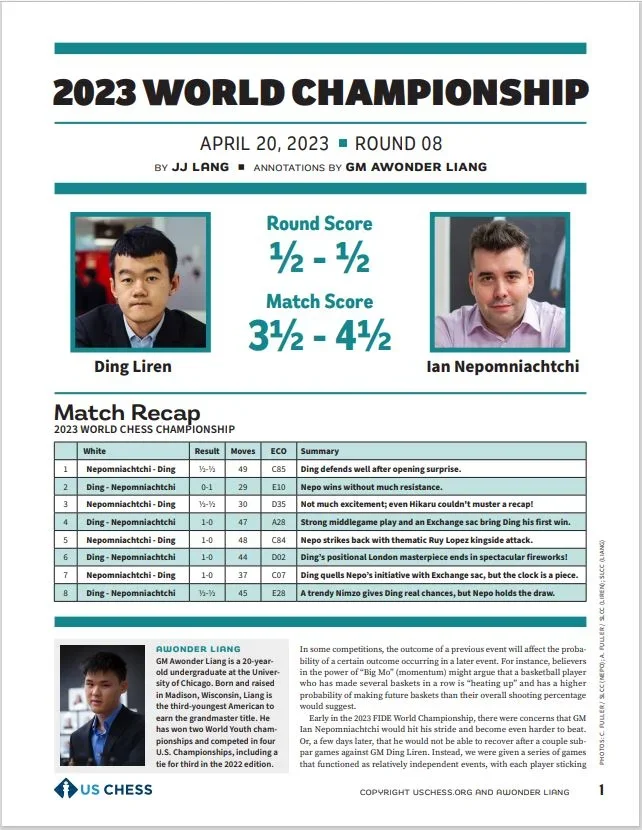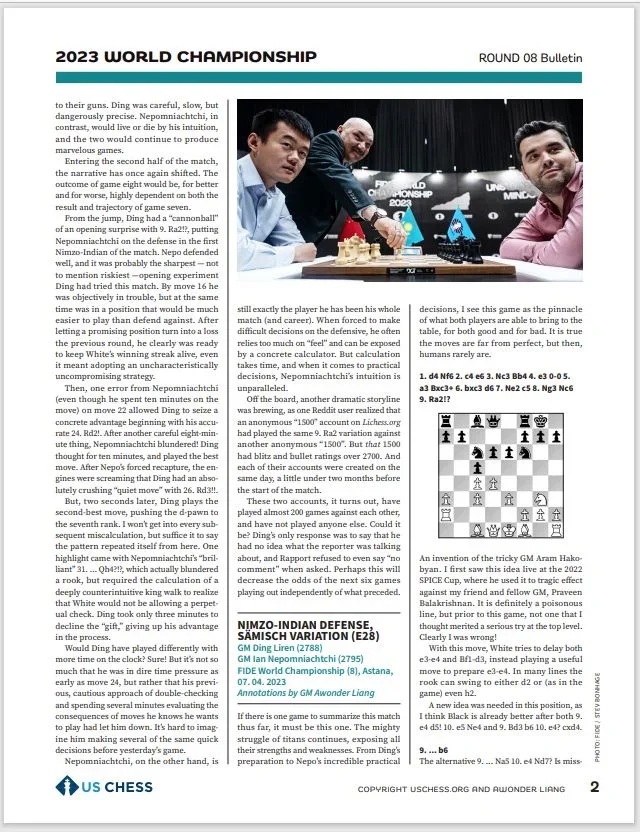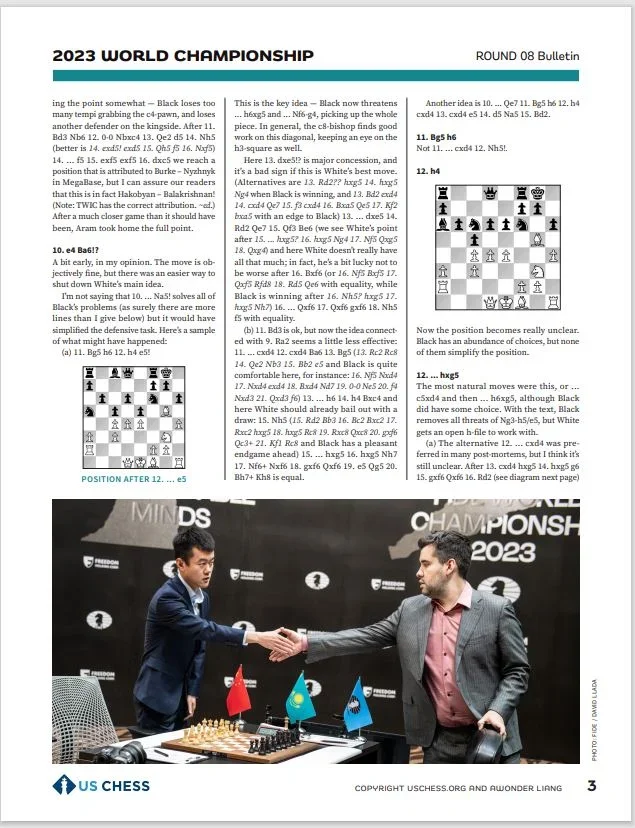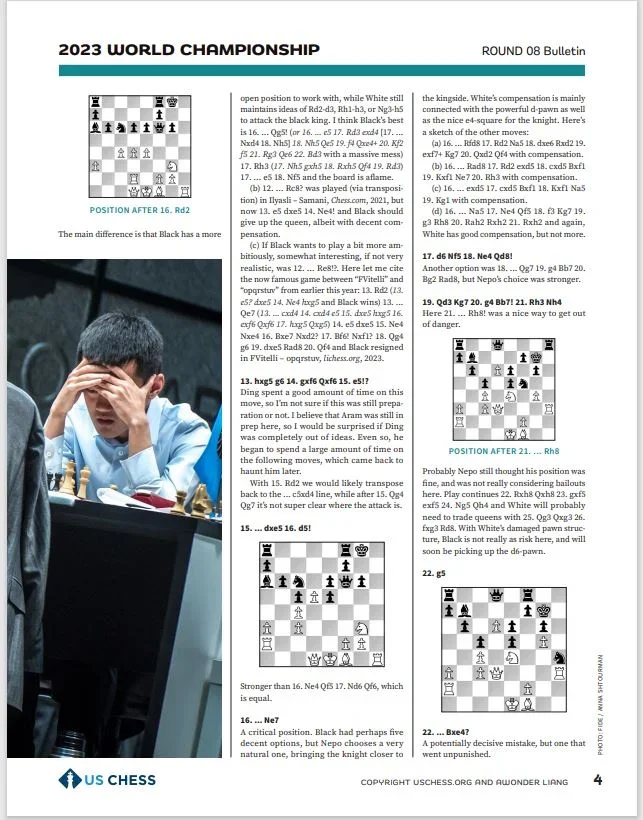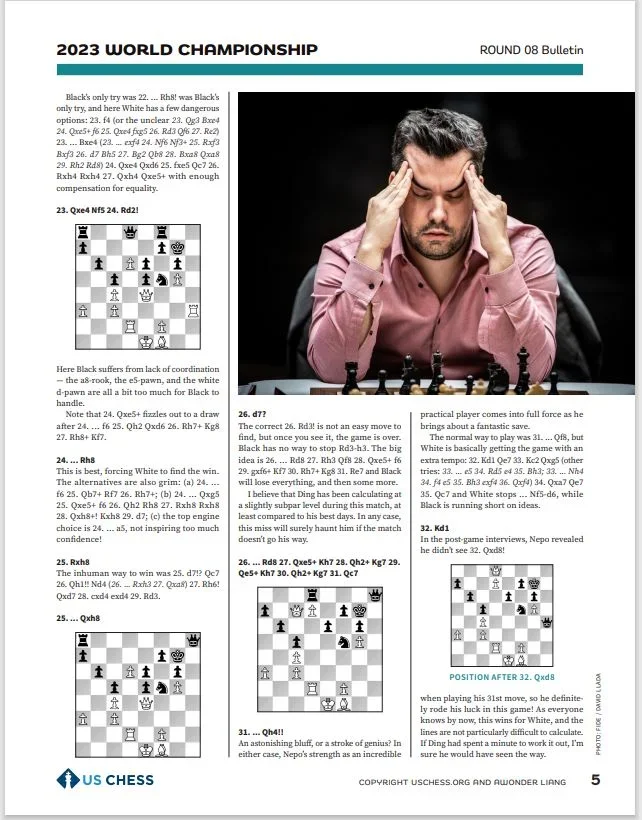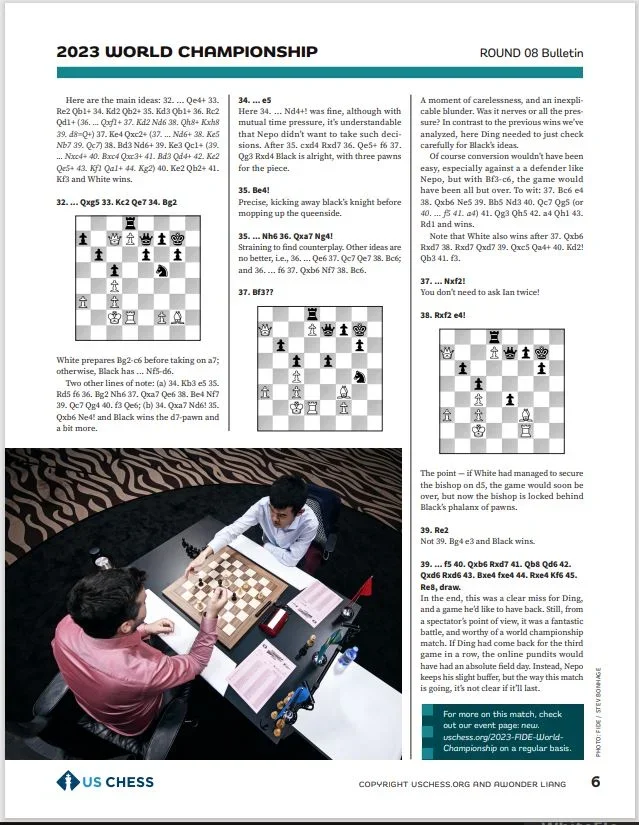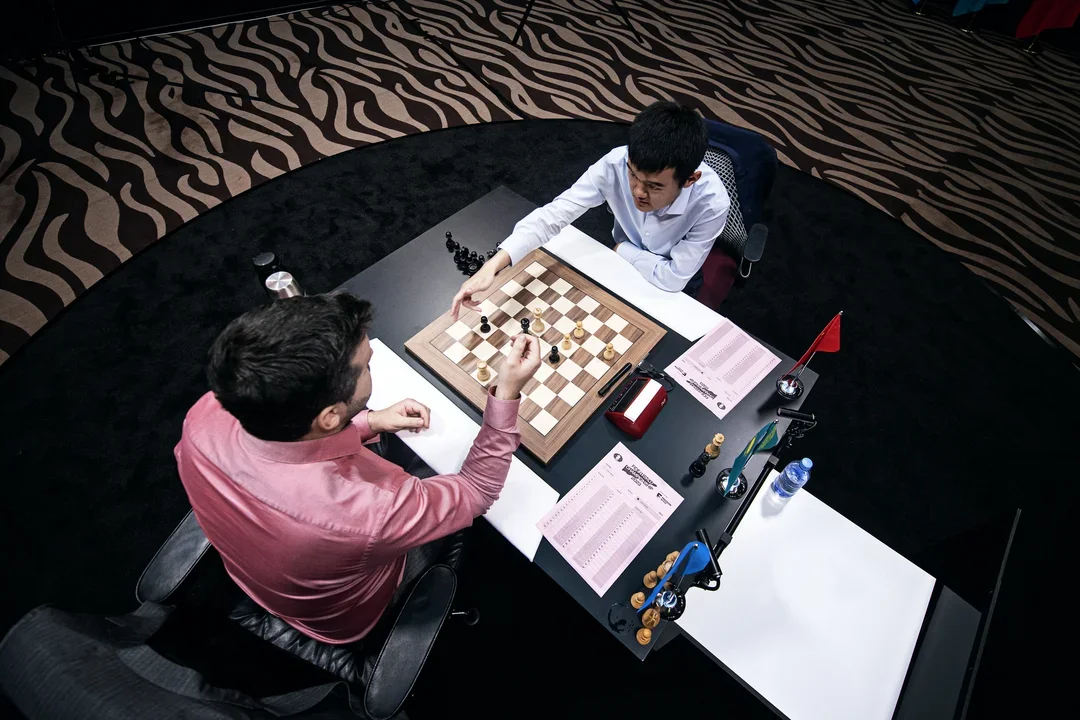
Please download today's printable bulletin to read along with GM Liang's annotations!
In some competitions, the outcome of a previous event will affect the probability of a certain outcome occurring in a later event. For instance, believers in the power of “Big Mo” (momentum) might argue that a basketball player who has made several baskets in a row is “heating up” and has a higher probability of making future baskets than their overall shooting percentage would suggest.
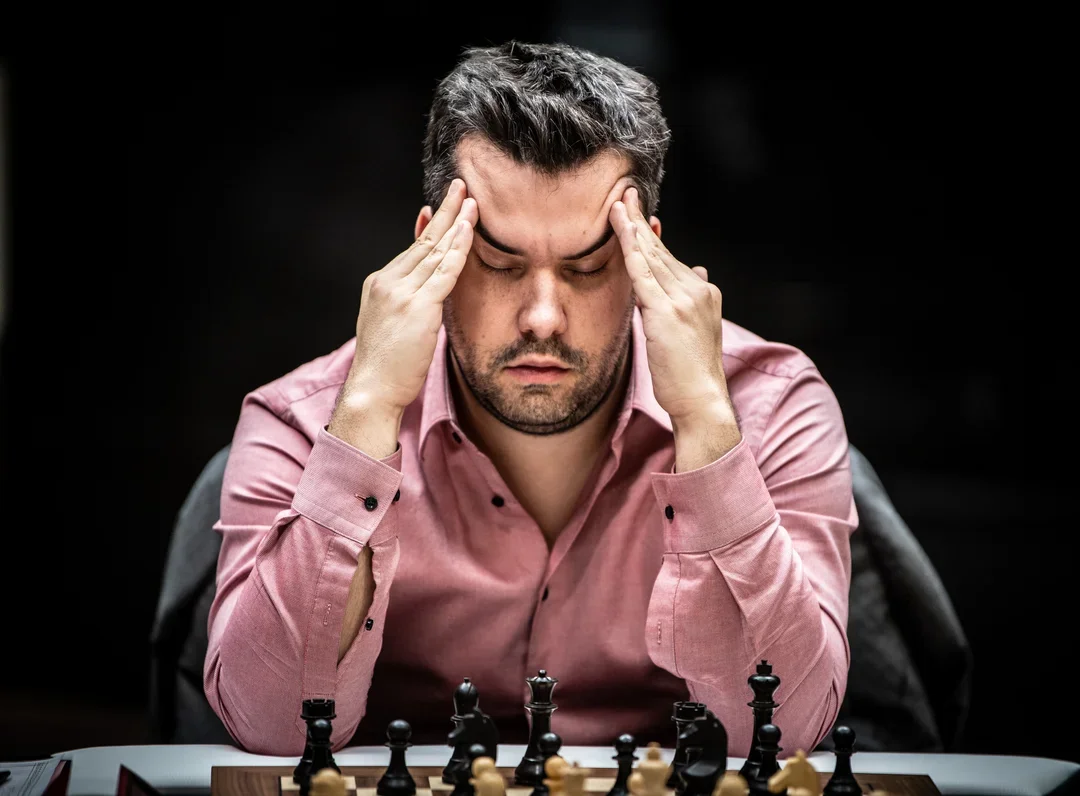
Early in the 2023 FIDE World Championship, there were concerns that GM Ian Nepomniachtchi would hit his stride and become even harder to beat. Or, a few days later, that he would not be able to recover after a couple subpar games against GM Ding Liren. Instead, we were given a series of games that functioned as relatively independent events, with each player sticking to their guns. Ding was careful, slow, but dangerously precise. Nepomniachtchi, in contrast, would live or die by his intuition, and the two would continue to produce marvelous games.
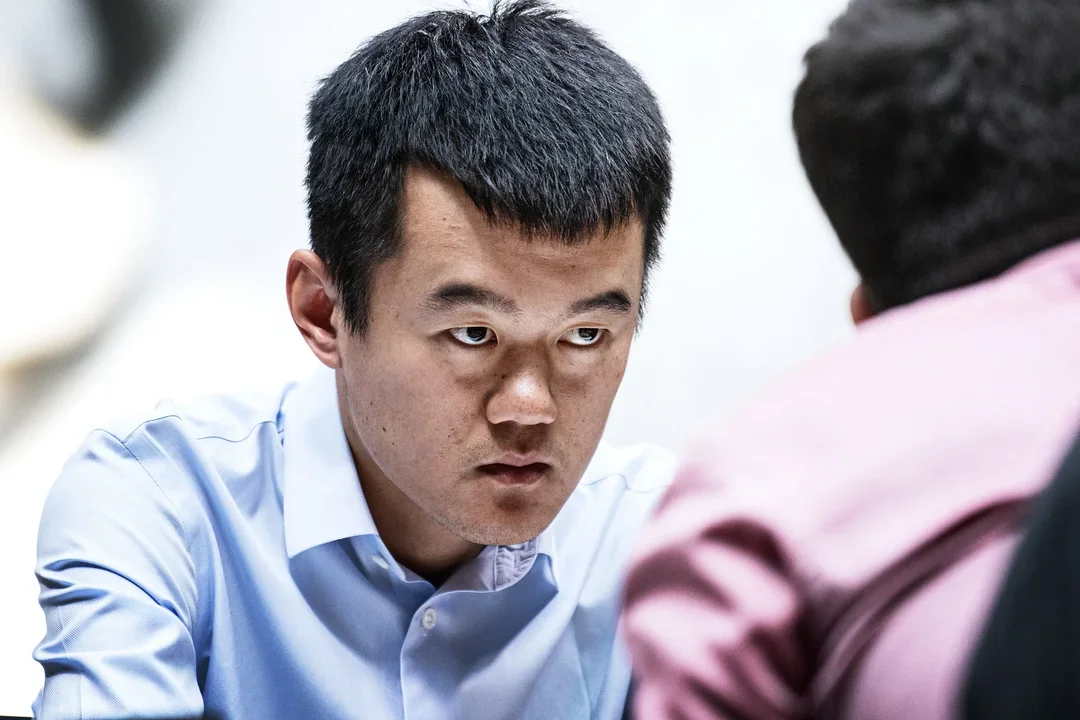
Entering the second half of the match, the narrative has once again shifted. The outcome of game eight would be, for better and for worse, highly dependent on both the result and trajectory of game seven.
From the jump, Ding had a “cannonball” of an opening surprise with 9. Ra2!?, putting Nepomniachtchi on the defense in the first Nimzo-Indian of the match. Nepo defended well, and it was probably the sharpest — not to mention riskiest —opening experiment Ding had tried this match. By move 16 he was objectively in trouble, but at the same time was in a position that would be much easier to play than defend against. After letting a promising position turn into a loss the previous round, he clearly was ready to keep White’s winning streak alive, even it meant adopting an uncharacteristically uncompromising strategy.
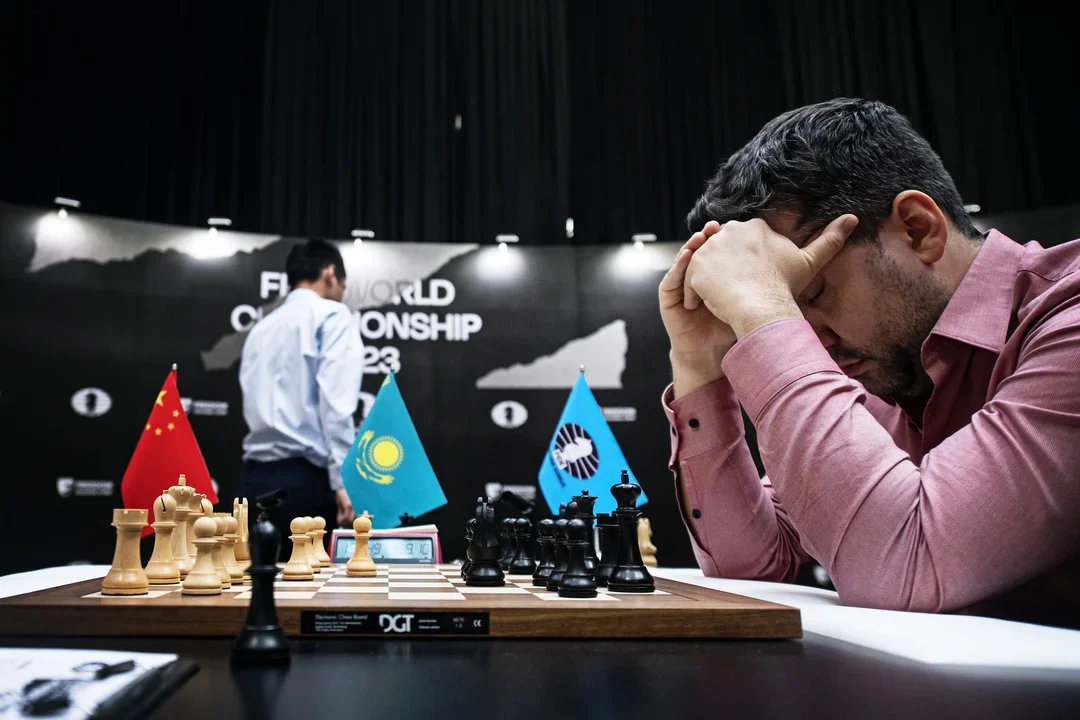
Then, one error from Nepomniachtchi (even though he spent ten minutes on the move) on move 22 allowed Ding to seize a concrete advantage beginning with his accurate 24. Rd2!. After another careful eight-minute think, Nepomniachtchi blundered! Ding thought for ten minutes, and played the best move. After Nepo’s forced recapture, the engines were screaming that Ding had an absolutely crushing “quiet move” with 26. Rd3!!.
But, two seconds later, Ding plays the second-best move, pushing the d-pawn to the seventh rank. I won’t get into every subsequent miscalculation, but suffice it to say the pattern repeated itself from here. One highlight came with Nepomniachtchi’s “brilliant” 31. … Qh4?!?, which actually blundered a rook, but required the calculation of a deeply counterintuitive king walk to realize that White would not be allowing a perpetual check. Ding took only three minutes to decline the “gift,” giving up his advantage in the process.
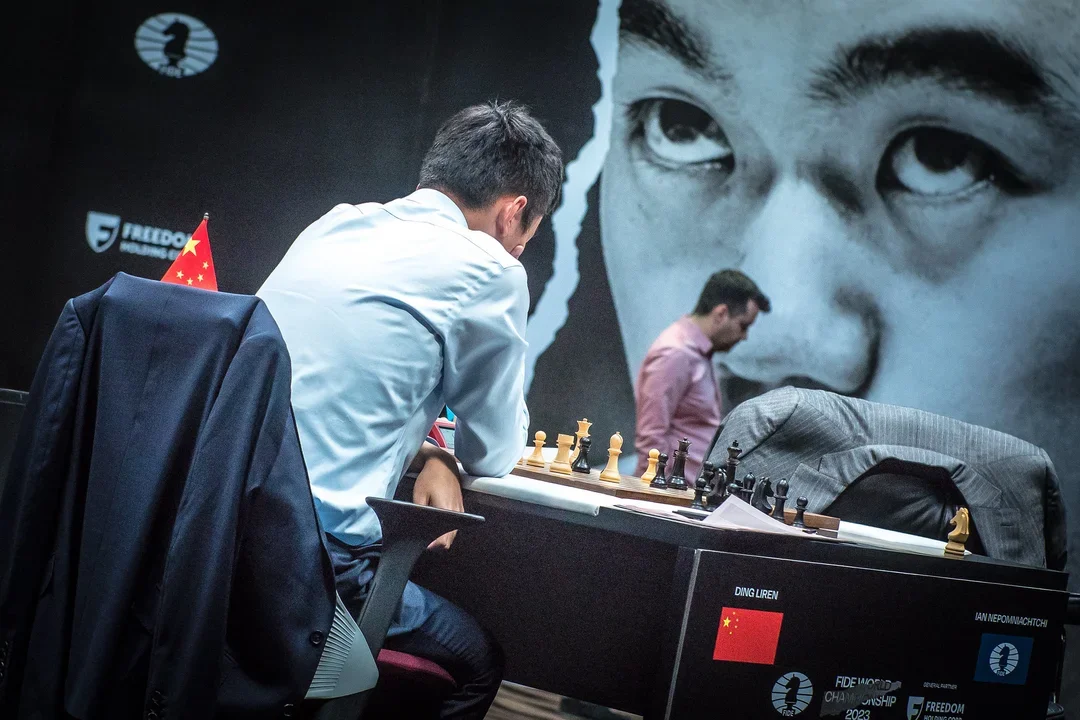
Would Ding have played differently with more time on the clock? Sure! But it’s not so much that he was in dire time pressure as early as move 24, but rather that his previous, cautious approach of double-checking and spending several minutes evaluating the consequences of moves he knows he wants to play had let him down. It’s hard to imagine him making several of the same quick decisions before yesterday’s game.
Nepomniachtchi, on the other hand, is still exactly the player he has been his whole match (and career). When forced to make difficult decisions on the defensive, he often relies too much on “feel” and can be exposed by a concrete calculator. But calculation takes time, and when it comes to practical decisions, Nepomniachtchi’s intuition is unparalleled.

Off the board, another dramatic storyline was brewing, as one Reddit user realized that an anonymous “1500” account on Lichess had played the same 9. Ra2 variation against another anonymous “1500”. But that 1500 had blitz and bullet ratings over 2700. And each of their accounts were created on the same day, a little under two months before the start of the match.
These two accounts, it turns out, have played almost 200 games against each other, and have not played anyone else. Could it be? Ding’s only response was to say that he had no idea what the reporter was talking about, and Rapport refused to even say “no comment” when asked. Perhaps this will decrease the odds of the next six games playing out independently of what preceded.
Today's annotations come once again from GM Awonder Liang. Liang is a 20-year-old undergraduate at the University of Chicago. Born and raised in Madison, Wisconsin, Liang is the third-youngest American to earn the grandmaster title. He has won two World Youth championships and competed in four U.S. Championships, including a tie for third in the 2022 edition.
See all of our 2023 FIDE World Championship coverage.
See results and full schedule on the official website.
Follow our lichess profile for more studies.
Watch live commentary of each round on Chess.com and from FIDE.
Categories
Archives
- December 2025 (27)
- November 2025 (29)
- October 2025 (39)
- September 2025 (27)
- August 2025 (29)
- July 2025 (43)
- June 2025 (25)
- May 2025 (24)
- April 2025 (29)
- March 2025 (29)
- February 2025 (20)
- January 2025 (24)
- December 2024 (34)
- November 2024 (18)
- October 2024 (35)
- September 2024 (23)
- August 2024 (27)
- July 2024 (44)
- June 2024 (27)
- May 2024 (31)
- April 2024 (51)
- March 2024 (34)
- February 2024 (25)
- January 2024 (26)
- December 2023 (29)
- November 2023 (26)
- October 2023 (37)
- September 2023 (27)
- August 2023 (37)
- July 2023 (47)
- June 2023 (33)
- May 2023 (37)
- April 2023 (45)
- March 2023 (37)
- February 2023 (28)
- January 2023 (31)
- December 2022 (23)
- November 2022 (32)
- October 2022 (31)
- September 2022 (19)
- August 2022 (39)
- July 2022 (32)
- June 2022 (35)
- May 2022 (21)
- April 2022 (31)
- March 2022 (33)
- February 2022 (21)
- January 2022 (27)
- December 2021 (36)
- November 2021 (34)
- October 2021 (25)
- September 2021 (25)
- August 2021 (41)
- July 2021 (36)
- June 2021 (29)
- May 2021 (29)
- April 2021 (31)
- March 2021 (33)
- February 2021 (28)
- January 2021 (29)
- December 2020 (38)
- November 2020 (40)
- October 2020 (41)
- September 2020 (35)
- August 2020 (38)
- July 2020 (36)
- June 2020 (46)
- May 2020 (42)
- April 2020 (37)
- March 2020 (60)
- February 2020 (38)
- January 2020 (45)
- December 2019 (34)
- November 2019 (35)
- October 2019 (42)
- September 2019 (45)
- August 2019 (56)
- July 2019 (44)
- June 2019 (35)
- May 2019 (40)
- April 2019 (48)
- March 2019 (61)
- February 2019 (39)
- January 2019 (30)
- December 2018 (29)
- November 2018 (51)
- October 2018 (45)
- September 2018 (29)
- August 2018 (49)
- July 2018 (35)
- June 2018 (31)
- May 2018 (39)
- April 2018 (31)
- March 2018 (26)
- February 2018 (33)
- January 2018 (30)
- December 2017 (26)
- November 2017 (24)
- October 2017 (30)
- September 2017 (30)
- August 2017 (31)
- July 2017 (28)
- June 2017 (32)
- May 2017 (26)
- April 2017 (37)
- March 2017 (28)
- February 2017 (30)
- January 2017 (27)
- December 2016 (29)
- November 2016 (24)
- October 2016 (32)
- September 2016 (31)
- August 2016 (27)
- July 2016 (24)
- June 2016 (26)
- May 2016 (19)
- April 2016 (30)
- March 2016 (36)
- February 2016 (28)
- January 2016 (32)
- December 2015 (26)
- November 2015 (23)
- October 2015 (16)
- September 2015 (28)
- August 2015 (28)
- July 2015 (6)
- June 2015 (1)
- May 2015 (2)
- April 2015 (1)
- February 2015 (3)
- January 2015 (1)
- December 2014 (1)
- July 2010 (1)
- October 1991 (1)
- August 1989 (1)
- January 1988 (1)
- December 1983 (1)


